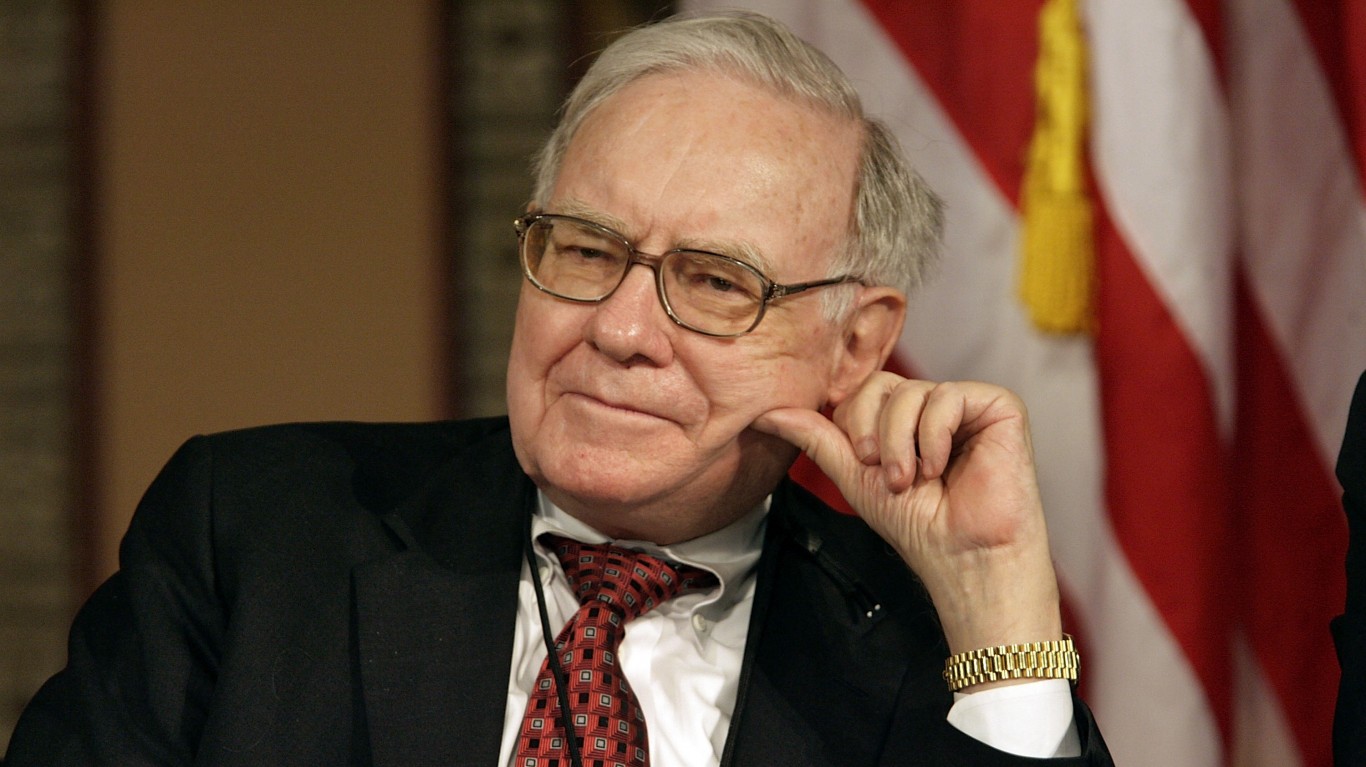Investing
10 Life Lessons From Warren Buffett Every Person in Their 70s Should Hear

Published:

Warren Buffet’s name is synonymous with exceptional investing and shrewd business. He has a long, successful career that has amassed him a vast fortune. But, perhaps more importantly, his career has yielded a wealth of wisdom applicable far beyond the world of finance.
For those entering their golden years, Warren Buffett’s wisdom holds a particular significance. Those in their 70s probably aren’t focusing on acquiring wealth or saving or retirement. However, Buffett’s philosophy is built on core principles of lifelong learning and a focus on living well – two things anyone in their 70s can get behind.
As we delve into these ten life lessons, we’ll learn how Warren Buffett recommends embracing your 70s.

Many people talk about getting to retirement, but not many financial advisors talk about what to do afterward. Luckily, Warren Buffett has plenty of advice for those living in retirement. You probably have a handle on your finances by now, but you may be surprised about what you can learn.

Warren Buffett is a big proponent of investing in yourself. According to Warren Buffett, “The best investment you can make is in yourself.” No one can take your talents from you, after all.
Investing in yourself is a truth that holds true even as you get older.

As you enter your 70s, you probably possess a wealth of experience and knowledge. You’ve had decades to build your skills, and you likely aren’t actively working anymore. Therefore, it may seem a bit pointless to build up even more skills.
However, just because you’re older doesn’t mean you should let yourself stagnate. Learning new things can improve your overall well-being, especially as you age.
Your 70s are probably full of free time – more than you’ve had in decades. Therefore, it’s the best time to explore new interests and rediscover old passions.

Decades of life experience have likely instilled a set of routines in you. But just because you’ve done things a certain way for years doesn’t mean it’s the best way for your 70s and beyond.
Warren Buffett, a man known for meticulous investing, understood the power of habits. It’s important not to let your habits get the best of you, especially when you’re in your 70s and have lots of habits.

Take a step back and evaluate your current habits to find areas for improvement. Healthy habits are an obvious focus for many in their 70s. For instance, you may decide to add a daily walk into your routine.
However, there are other habits to look for, too. You may add habits to incorporate some of the other advice on this page. Maybe you schedule some learning time into your day, for example.
Consciously refining your habits helps ensure that you cultivate your lifestyle and not the other way around!

Warren Buffett famously recommends learning – and a lot of it! Just a little digging unearths tons of quotes from Buffett on learning, including “The more you learn, the more you earn.” This learning doesn’t have to be active, like taking classes, for instance. It can also mean learning about yourself.
For instance, one habit Buffett recommends is spending time sitting every day, just to think. This passive time can be just as important as actively learning.
As we’ve discussed, you’re never too hold to implement this advice, even in your 70s.

Entering your 70s doesn’t signify the end of your intellectual journey. In fact, all the extra time in retirement can be dedicated to this important habit even more.
Embracing a learning mindset and being curious is often all you need to find new ways to keep your mind sharp. You could consider learning a new language, mastering a new life skill, or jointing a local book club can all provide continuous learning opportunities.
The knowledge you gain from learning continuously helps keep your mind sharp and even introduces you to new friends.

Warren Buffett emphasizes integrity, once stating, “It takes 20 years to build a reputation and five minutes to ruin it.” In your 70s, you don’t have time to rebuild your reputation. However, it is time to maintain your reputation by conducting yourself honestly.
Your golden years are a great time to lean on your connections with loved ones and engage with your community.

Building strong relationships in your 70s is vital. With so much time on your hands, spending at least some of that time with people you care about is important. At the heart of any relationship lies trust. By acting with integrity, you can ensure your relationships last through the decade.
This foundation of integrity strengthens your existing bonds and can open doors for new connections.

As you enter your 70s, you’re probably trying to figure out what to do with the rest of your life! If you haven’t already, unearthing your passion can answer just that question for you. Your 70s are the perfect time to chase what you truly love doing.
According to Warren Buffett, “When you are living a life of passion and obsession, there are no limits.” If you’ve spent your whole life not chasing your passions, now is the time to do it.

Now that you’ve retired, you’re probably looking for a new purpose in life. You’re no longer working, so now what? Your passion fuels purpose, especially in your later years. It’s all about harnessing your inner drive and having goals you care about.
For instance, you might reignite a love of music by joining a choir, starting a garden, or finally sitting down and writing that novel. Whatever you decide to do, it should be something you love!

Humans thrive on connection. Sadly, many people in their 70s don’t get enough of it. Many seniors are socially isolated, which can lead to all sorts of health problems. Warren Buffett recommends establishing conscious relationships, “You want to associate with people who are the kind of person you’d like to be. You’ll move in that direction.”
In your 70s, this is even more true. If you want to be active and fulfilled in your 70s, you should hang out with other people who are seniors and active.

Strong social connections aren’t just a source of joy. They’re essential. Nurturing relationships with your loved ones should be at the top of your priority list. Engage with your community to find a sense of purpose, especially if it involves your passion!
Social interaction provides you with a fun way to spend your days and pass on your wisdom to younger generations. While friends of your own age are important, you should also interact with younger people.
You could consider catching up with friends regularly (such as on Tuesday for lunch every week) or volunteering for a cause you care about.

Your 70s might be a time to reflect on a life well-lived, but that doesn’t mean it’s time to settle into a rocking chair just yet. Warren Buffett recommends taking calculated risks, and this doesn’t have to stop just because you’re older!
Buffett once explained, “Risk comes from not knowing what you’re doing.” Calculated risks, for instance, aren’t really risks, according to Warren Buffett.
Navigate your 70s with a touch of courage, but don’t give into blind recklessness, either.

The key here is to strike a balance between boldness and prudence. You want to carefully evaluate any risks and rewards to make an informed decision. Don’t just stay in your comfort zone, even if it’s often easier.
Perhaps you’ve always dreamed about travel, for instance. Your 70s can be the perfect time to embark on long-awaited adventures and cross-cultural barriers.
Just because you’re in your 70s doesn’t mean you should just sit around!

Financial security is a cornerstone of a fulfilling life, especially in your 70s. While you may have accumulated wealth over the years, Warren Buffett doesn’t recommend spending it as quickly as possible.
Buffett himself lives a very modest life despite being very wealthy. He’s a big believer in living below your means, allowing you to save more and use your money wisely.
This philosophy translates to your golden years, too, even if you aren’t trying to save for retirement anymore. Adopting a frugal mindset allows you to free up resources for what truly matters, like travel and pursuing your passions.

Being frugal is not about deprivation. In fact, it’s about the opposite. Being frugal allows you to make smart financial choices.
Perhaps it means re-evaluating your monthly subscriptions or downsizing to a more manageable living space. It could involve embracing delicious home-cooked meals instead of frequent restaurant outings.
These small adjustments add up over time, creating a financial buffer that allows you to weather unexpected costs and use your money for what you really want to use it for.
Financial security is built on frugality, and financial security is vital for living well in your retirement.

Warren Buffet is a renowned philanthropist. He gives much of his wealth to charity and recommends others do the same. He recommends anyone who wants to leave a legacy should consider the difference they can make in the lives of others – not just accumulating wealth.

Giving back to your community through financial contributions or volunteering helps you connect with others and leave a legacy that matters. If you’re passionate about environmental conservation, consider volunteering at a local nature preserve.
You may tutor underprivileged children or volunteer at your church. Whatever you choose to do, the important part is giving back in your golden years.
The possibilities for making a difference are boundless.
It’s not just about financial contributions, though those are often welcomed. You can also share your time or skills. If you have any skills from your career that not-for-profits may benefit from, consider donating your expertise.

You’ve probably been looking forward to retirement for a long time! However, it isn’t odd for retirees to become bored during retirement. While retirement is stereotypically a time when you’re supposed to lay back and relax, it absolutely doesn’t have to be!
Warren Buffett once said, “Life is like a snowball. The important thing is finding wet snow and a really long hill.” Simply put, it’s about finding the right environment for you. That may mean lounging around at home, or it could mean going on a grand adventure.

You should actively seek experiences to spark your curiosity. You want to keep your life vibrant and engaging. Travel to new places, even if it’s just a new restaurant down the road. Reconnect with old friends or make some new ones. You could even do something simple like trying a new recipe!
Remember, joy is not a destination. It’s enjoying the journey. If you want to slow down in your 70s, you absolutely can (and health difficulties may force you to, eventually). The key is to enjoy where you are.
Are you ready for retirement? Planning for retirement can be overwhelming, that’s why it could be a good idea to speak to a fiduciary financial advisor about your goals today.
Start by taking this retirement quiz right here from SmartAsset that will match you with up to 3 financial advisors that serve your area and beyond in 5 minutes. Smart Asset is now matching over 50,000 people a month.
Click here now to get started.
Thank you for reading! Have some feedback for us?
Contact the 24/7 Wall St. editorial team.